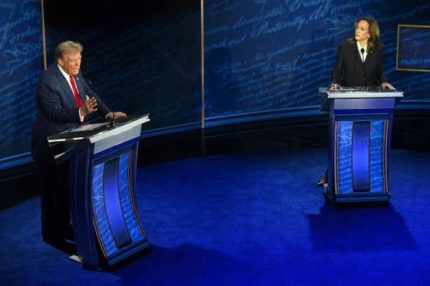Vice President Kamala Harris and former President Donald Trump took center stage in Philadelphia on Tuesday night for the first and potentially only debate before the 2024 presidential election. Moderated by ABC News’ David Muir and Linsey Davis, the heated 90-minute session saw both candidates spar on critical topics like the economy, immigration, abortion, energy, and foreign policy crises including the Israel-Gaza conflict and Ukraine war.
Trump repeatedly maintained his false claims of winning the 2020 election, while Harris distanced herself from the Biden administration’s handling of the immigration crisis and emphasized her own leadership vision. The debate often devolved into chaos, with both candidates speaking over each other despite microphone restrictions, forcing the moderators to intervene.
Donald Trump Takes the Bait: A Battle of Crowds and Claims
Throughout the debate, Kamala Harris successfully needled Donald Trump on several issues, with crowd sizes at rallies emerging as a flashpoint. Harris quipped that Trump’s rallies were losing steam, with people leaving early due to boredom, a remark that clearly irked the former president.
Trump, in an effort to rebut, accused Kamala Harris of artificially inflating her rally sizes through paid attendees and even invoked a debunked theory involving AI manipulation. This back-and-forth underscored Trump’s sensitivity to the optics of his public image, a dynamic that Kamala Harris capitalized on. While the moderators tried to steer the conversation back to substantive issues, Trump’s insistence on addressing personal attacks highlighted his tendency to veer off course.
Moderators Fact-Check Trump’s Claims: Tensions Rise
One of the most contentious moments of the debate occurred when Trump repeated unfounded claims about immigrants in Ohio allegedly eating pets, and Democrats supporting post-birth executions of babies. Moderator David Muir fact-checked Trump on the spot, clarifying that the city manager of Springfield, Ohio, had found no credible evidence to support these accusations.
Trump’s claims about Democrats supporting “executions after birth” were similarly debunked by Linsey Davis, who pointed out that no state in the U.S. allows such a practice. Trump’s reliance on disinformation drew criticism from viewers and sparked a backlash from MAGA supporters online, as they accused the moderators of bias. This exchange highlighted the broader challenge of fact-checking in real-time during a high-stakes debate.
Kamala Harris Pressed on Shifting Stances: A Balancing Act
Kamala Harris was put on the defensive when questioned about her evolving positions on key issues such as fracking, gun control, and immigration. In 2020, she advocated for banning fracking and decriminalizing border crossings, but she has since taken a more moderate stance. When asked about this shift, Harris emphasized that her “values have not changed,” citing her support for the Inflation Reduction Act, which opened new fracking leases.
While Kamala Harris attempted to maintain consistency in her principles, she struggled to clearly define when and why her positions had shifted. This moment exposed her challenge of balancing progressive ideals with the political pragmatism required to appeal to a broader electorate in the general election.
Kamala Harris Distances Herself from Biden: A Bid for Independence
A notable theme throughout the debate was Kamala Harris’ effort to establish herself as a candidate distinct from both President Joe Biden and Donald Trump. Harris opened with a statement underscoring this difference: “Clearly, I am not Joe Biden, and I am certainly not Donald Trump.” She repeatedly framed herself as a new generation of leadership, aiming to move beyond the divisions of the past and chart a course for the future.
Kamala Harris’ remarks on Biden seemed designed to reassure voters wary of his age and policies, while also carving out space for her own platform. The vice president made a point of addressing the January 6 attack, calling for Americans to turn the page on the chaos of the past and focus on the future. Her argument that the American people deserve a president who invests in “dreams and aspirations, not hate and division,” aimed to present herself as a unifying figure.
Foreign Policy Showdown: Who Commands Global Respect?
Foreign policy was another contentious arena, with Harris accusing Trump of being soft on Russian President Vladimir Putin. She argued that if Trump were president, Putin would be “sitting in Kyiv” today. Harris also positioned herself as a strong ally to NATO and European countries, stressing that these nations are relieved Trump is no longer in office.
Trump, in turn, touted his personal relationships with world leaders, claiming that they “respect your president,” a reference to himself, and criticizing the current administration’s handling of global affairs. His assertions that America is a “failing nation” and “laughed at all over the world” reflected his central campaign theme of restoring U.S. strength and credibility. Harris, meanwhile, aimed to portray Trump as a leader who would prioritize personal relationships over national interests, a critique that resonated particularly in battleground states like Pennsylvania.
A Debate Filled with Sharp Contrasts
The Harris-Trump debate provided voters with a stark contrast between two candidates with vastly different visions for America’s future. Harris sought to position herself as the candidate of unity, hope, and progress, distancing herself from the Biden administration while casting Trump as a divisive figure who thrives on chaos. Trump, on the other hand, leaned heavily on his populist rhetoric, railing against establishment politics and touting his personal brand of leadership.
With just weeks left until the 2024 election, the debate likely reinforced existing loyalties among voters. However, for undecided voters, the evening’s exchanges may have offered critical insights into the candidates’ personalities and priorities as they prepare to cast their ballots.














